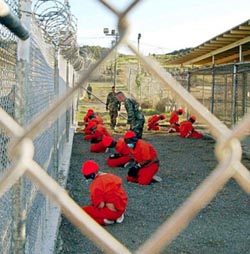Untitled Document
John G. Roberts, the new Supreme Court nominee is sure to keep the skids greased
in the continuing story of this nation's decline. Check out one of this police-state
freak's big opinions on the Appeals court -- from Law.com
02-22-2005:
There was another WMATA [Washington Metropolitan
Area Transit Authority] case -- known as the french fry case -- which some
critics point to as a sign of a certain hard-heartedness in Roberts' decision
making.
In the unanimous ruling last October in Hedgepeth v. WMATA, Roberts upheld
the arrest, handcuffing and detention of a 12-year-old girl for eating a single
french fry inside a D.C. Metrorail station. "No one is very happy about
the events that led to this litigation," Roberts acknowledged in the decision,
but he ruled that nothing the police did violated the girl's Fourth Amendment
Not content to rubberstamp cops kidnapping little girls off the subway and
searching through car trunks without a warrant; Roberts has also done his level-best
to cover-up Cheney's pre-Iraq shenanigans. As People
for the American Way points out.
In re: Richard B. Cheney, Vice President of the United States, 2003 U.S. App.
LEXIS 18831 (D.C. Cir. 2003), cert. granted, 2003 U.S. LEXIS 9205 (2003):
secrecy of Vice President Cheney's energy task force
Judge Roberts was one of the dissenters in the court's 5-3 denial of a petition
for rehearing en banc (with one judge not participating) filed by the Bush Administration
in its continuing efforts to avoid releasing records pertaining to Vice President
Cheney's energy task force. This ruling came in litigation brought by Judicial
Watch and the Sierra Club charging that the Vice President's task force had
violated federal law by not making its records public. The court's ruling marked
"the fourth time a judicial panel has rebuffed efforts to keep the information
from the public." Carol D. Leonnig, "Energy Task Force Appeal Refused,"
Washington Post (Sept. 12, 2003). At the Administration's urging, the Supreme
Court has agreed to review the case; a decision is expected by the end of June
2004.
You may recall that lawsuit produced
documents proving
that Cheney and his oil cronies were carving up maps of Iraq's oilfields months,
or even years before the invasion. And then, just last Friday, Roberts earned
his final bones just last week by backing the military detention of "enemy
combatants" -- even Americans-- in the Guantanamo concentration camp in
the name of the unConstitutional undeclared War on Terror. This is from an opinion
Roberts signed on to issued last Friday, July 15 2005 in the case of Hamdan
v Rumsfeld:
 |
"The trial and punishment of enemy combatants," the Court further
held, is thus part of the "conduct of war." Id. We think it no answer
to say, as Hamdan does, that this case is different because Congress did not
formally declare war. It has been suggested that only wars between sovereign
nations would qualify for such a declaration. See John M. Bickers, Military
Commissions are Constitutionally Sound: A Response to Professors Katyal and
Tribe, 34 TEX. TECH. L. REV. 899, 918 (2003). Even so, the joint resolution
"went as far toward a declaration of war as it might, and as far or further
than Congress went in the Civil War, the Philippine Insurrection, the Boxer
Rebellion, the Punitive Expedition against Pancho Villa, the Korean War, the
Vietnam War, the invasion of Panama, the Gulf War, and numerous other conflicts."
Id. at 917. The plurality in Hamdi v. Rumsfeld, in suggesting that a military
commission could determine whether an American citizen was an enemy combatant
in the current conflict, drew no distinction of the sort.

